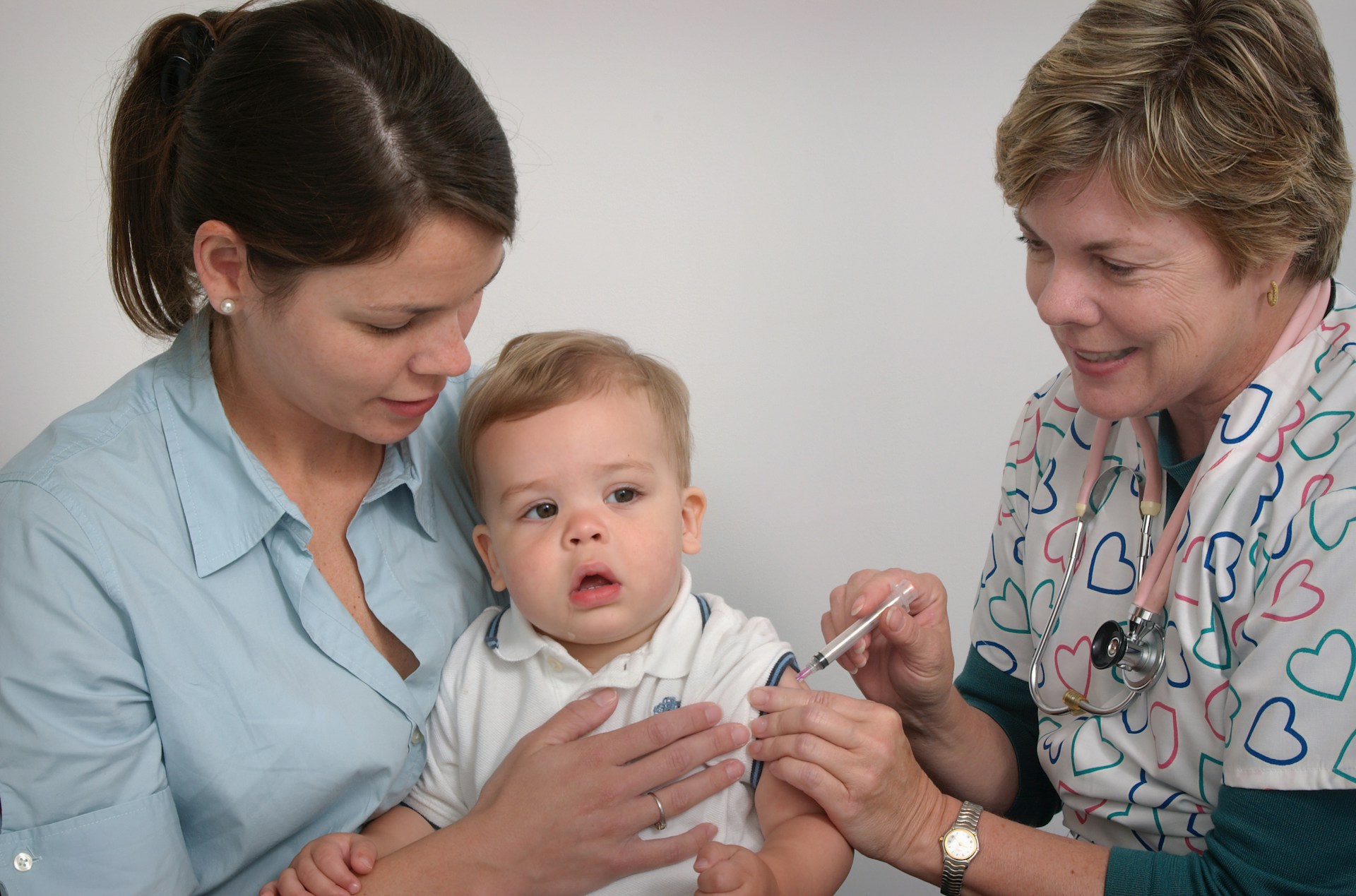The Relationship between Knowledge and Motivation of Mothers with Immunization Compliance in Toddlers in Lembang Tondon Working Area of The Tondon Health Center, North Toraja, 2022

Downloads
Background: Immunization plays a crucial role in reducing infant mortality and morbidity from vaccine-preventable diseases and should be administered from birth. Immunization is a crucial preventive measure to protect children from various preventable and dangerous diseases. However, preliminary interviews with five mothers in the Tondon Community Health Center area revealed persistent discrepancies in immunization implementation.
Objectives: This study aims to examine the relationship between maternal knowledge and motivation and their compliance with immunization schedules for toddlers in Lembang Tondon, within the working area of the Tondon Health Center, North Toraja Regency, in 2022.
Methods: A retrospective, cross-sectional design was employed, where data on both independent and dependent variables were collected simultaneously. The study population included all mothers of toddlers in Lembang Tondon, totaling 129, with a sample size of 97 mothers selected for participation. Data collection occurred from August to November 2022 using questionnaires and child health monitoring books. Data analysis was conducted using the Chi-Square test.
Results: The findings revealed that most mothers had good knowledge about immunization (60 respondents or 61.9%), high motivation to immunize their children (71 respondents or 65.9%), and complied with immunization guidelines (63 respondents or 64.9%). The p-value for maternal knowledge was 0.002 (<0.05) and for motivation, it was 0.000 (<0.05), indicating statistical significance.
Conclusion: The study concludes that there is a significant relationship between maternal knowledge and compliance with toddler immunization, as well as between maternal motivation and immunization compliance, in Lembang Tondon. Although all toddlers in the study had received immunizations, some had not been immunized according to the recommended schedule, indicating a gap in maternal adherence to timely immunization.
Andalia, N. et al. (2018) ‘Pemberian Imunisasi Dasar pada Bayi berdasarkan Tingkat Pengetahuan Ibu di Kabupaten Aceh Jaya’, Serambi Saintia, VI(2), pp. 40–45. https://ojs.serambimekkah.ac.id/serambi-saintia/article/view/795/680.
Ariani, P.A. (2017) lmu Gizi Dilengkapi dengan Standar Penilaian Status Gizi dan Daftar Komposisi Bahan Makanan. Yogyakarta: Nuha Medika.
Azmi, Z. (2018) ‘Perilaku Orang Tua Anak Yang Tidak Mendapatkan Imunisasi Di Wilayah Kerja Puskesmas Toddopuli Kota Makassar’, Universitas Islam Negeri Alauddin Makassar, pp. 200–209. https://repositori.uin-alauddin.ac.id/16138/1/ZAHRATUL%20AZMI%2070200114087.pdf
Dinas Kesehatan Provinsi Sulawesi Selatan (2020) ‘Profil Dinas kesehatan kota Makassar tahun 2020’, Das Europäische Gleichgewicht der Zukunft, pp. 11–16.
Effendi, N. (2019) Tingkat Pengetahuan. Jakarta: Salemba Medika.
Hasanah, S. (2020) ‘Hubungan Tingkat Pengetahuan Ibu tentang Imunisasi Dasar Terhadap Kepatuhan Pemberian Imunisasi Dasar pada Bayi dI Wilayah Kerja Puskesmas Madurejo Pangkalan’, 2507(February), pp. 1–9.
Kementerian Kesehatan RI (2018a) ‘Laporan Riskesdas 2018 Nasional’, Lembaga Penerbit Balitbangkes, p. hal 156. Available at: https://repository.badankebijakan.kemkes.go.id/id/eprint/3514/1/Laporan Riskesdas 2018 Nasional.pdf.
Kementerian Kesehatan RI (2018b) ‘Petunjuk Teknis Pelaksanaan Bulan Imunisasi Anak Sekolah (Bias)’, pp. 1–106.
Kementerian Kesehatan RI (2018c) Profil Kesehatan Indonesia 2018. Available at: https://doi.org/10.1002/qj.
Kementrian Kesehatan RI (2020) Profil Kesehatan Indonesia tahun 2020.
Lestari, L.T., Muharyani, P.W. and Hikayati (2020) ‘Determinan Faktor Yang Berhubungan Dengan Kepatuhan Ibu dalam Pemberian Imunisasi Dasar Pada Bayi’, Seminar Nasional Keperawatan “Penguatan keluarga sebagai support system terhadap tumbuh kembang anak dengan kasus paliatif” Tahun 2019, 1(2), pp. 1–8.
Mardianti and Farida, Y. (2020) ‘Correlation factors with basic immunization status in infants in South Rengasdengklok, Karawang Distric’, Jurnal Kebidanan Indonesia, 11(1), pp. 17–29. https://jurnal.stikesmus.ac.id/index.php/JKebIn/article/view/322.
Notoatmodjo, S. (2015) ‘Promosi Kesehatan’, in Teori dan Aplikasi. Jakarta: Rineke Cipta.
Notoatmodjo, S. (2017a) ‘Ilmu Kesehatan Masyarakat’, in Prinsip-prinsip Dasar. Jakarta: Rineke Cipta.
Notoatmodjo, S. (2017b) ‘Promosi Kesehatan dan Prilaku’, in Promosi Kesehatan dan Prilaku. Jakarta: Rineke Cipta.
Noveriani, W.E. (2016) ‘Faktor-faktor Yang Mempengaruhi Bayi Tidak Mendapat Imunisasi Dasar Lengkap Desa Tilote Kecamatan Tilango Kabupaten Gorontalo’, Journal of Chemical Information and Modeling, 53(9), p. Universitas Negeri Gorontalo, 1689-1699. https://siat.ung.ac.id/files/wisuda/2016-1-1-14201-841412007-abstraksi-01082016064429.pdf.
Sari, D.N.I., Basuki, S.W. and Triastuti, N.J. (2017) ‘Hubungan Pengetahuan Ibu Tentang Imunisasi Dasar Dengan Kelengkapan Imunisasi Dasar Bayi Di Wilayah Kerja Puskesmas Bendo Kabupaten Magetan’, Biomedika, 8(2). Available at: https://doi.org/10.23917/biomedika.v8i2.2910.
Triana V (2015) ‘Faktor Yang Berhubungan Dengan Pemberian Imunisasi Dasar Lengkap Pada Bayi Tahun 2015’, Proceedings of the Coastal Engineering Conference, 10(2), pp. 123–135. Available at: https://doi.org/10.1061/9780784402429.374.
WHO. (2018). 10 facts on immunization. World Health Organization https://www.who.int/mongolia/health-topics/vaccines/10-facts-on-immunization.
Winardi (2017) Motivasi dan Penmotivasian dalam Manajemen. Cetakan Pe. Jakarta: PT. Raja Grafindo Perkasa.
Copyright (c) 2025 Chris Manguma, Etty Manguma

This work is licensed under a Creative Commons Attribution-ShareAlike 4.0 International License.
Media Gizi Kesmas by Unair is licensed under a Creative Commons Attribution-ShareAlike 4.0 International License.
1. The journal allows the author(s) to hold the copyright and to retain the publishing right of the article without restrictions.
2. The legal formal aspect of journal publication accessibility refers to Creative Commons Attribution-Share-Alike (CC BY-SA).
3. The Creative Commons Attribution-Share-Alike (CC BY-SA) license allows re-distribution and re-use of a licensed work on the conditions that the creator is appropriately credited and that any derivative work is made available under "the same, similar or a compatible license”. Other than the conditions mentioned above, the editorial board is not responsible for copyright violations.



















